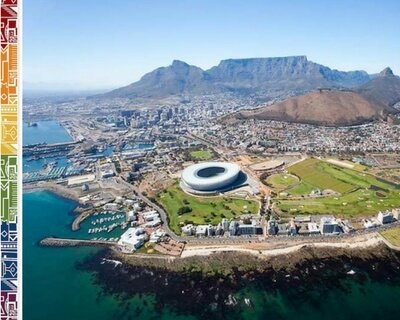Cape Town Transport Options
Expat Cape Town| What's to Know About Getting Around in Cape Town
Cape Town Transport | 20 November 2019 | Regina Gräff
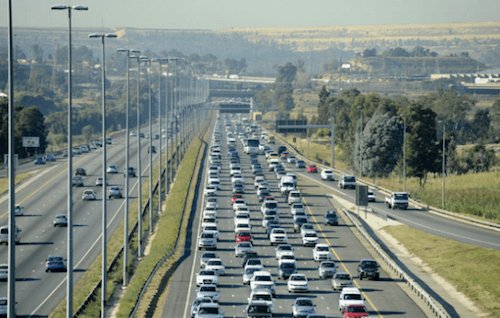 Rush hour traffic in Cape Town
Rush hour traffic in Cape TownThe Cape Town transport network urgently needs a solution for reducing the traffic congestion in the Mother City. Cape Town is South Africa's most congested city and ranks worldwide as 90th of 403 cities according to TomTom's Traffic Index. Peak traffic in Cape Town starts early in the mornings - traffic jams can be encountered as early as 5h30 and can last then until 10h00 - and in the evenings rush hour lasts generally from 15h until 18h30.
The public transport network is underdeveloped and ranks at the lower end of the Transport Development Index (TDI) which compares the world's major cities' direct cost of public transport networks, their safety and flexibility and also examines the safety and congestion on the city's roads. In 2015, Cape Town ranked only at 73rd position of 85 cities worldwide. But there is light on the horizon as the first of the long promised new commuter trains have arrived in the Mother City.
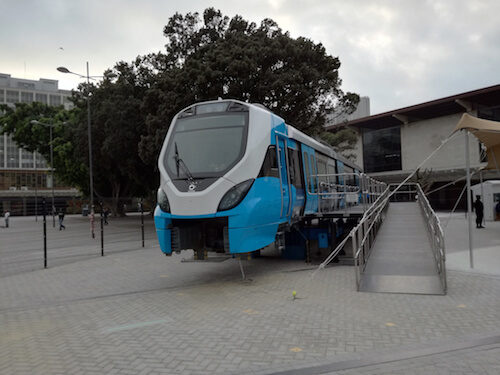 New trains for Cape Town
New trains for Cape TownMost of the local commuters use minibus taxis, buses and metro rail for their daily transport. 95% of the people using public transport as their main means of commuting are from the low and middle income groups. The Cape Town Public Transport system, however, is not yet adequate for the constantly increasing city population and the high number of commuters. Currently only 54 train sets are running, due to lack of maintenance or vandalism whereas 88 trains would be needed for the delivery of efficient service.
Already several years ago, it was announced that new trains would be rolled-out to increase volumes and reliability. The expanding MyCiti bus rapid transport network and a higher number of modern commuter trains linking the Eastern and Southern suburbs to the city are hoped to ease the current congestion on the roads. Read more here.
More than 900 000 private cars are registered in Cape Town and almost 1.5 million passengers travel by private car daily. Travel times by car are often long when you have to commute to your workplace in the CBD and you have to plan wisely when and where to travel ahead of time. Major road construction projects are under way in many parts of the city to improve the situation. The roadworks to complete dual carriage ways such as on Ou Kaapse Weg and Bosmans Dam Road which are main arterials in the city will help ease some of the congestion in the near future, until then daily commutes by car are tiring and some stretches of the Cape Town road system will be a big headache to all commuters.
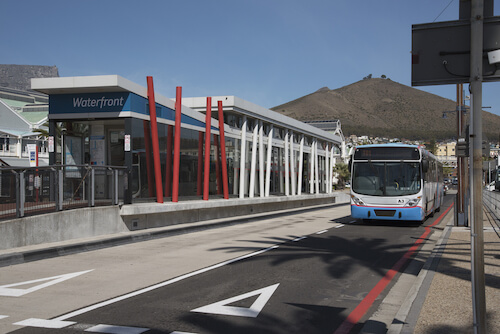 MyCiti Busses run throughout the city
MyCiti Busses run throughout the cityYour Cape Town Transport Options
Most long-term visitors such as interns or expats will have to rely on their own transport to get to work or manage the daily routine e.g. driving the children to school, going shopping or visiting friends and thus will need to make wise decisions regarding their daily commutes as mentioned above.
Short-term visitors staying in the city center or along the popular Atlantic seaboard beaches, however, will enjoy using the well-structured Cape Town bus network - at least for part of their holidays in the Mother City as for exploring the West Coast, Cape Winelands or Garden Route, renting your own car is highly recommended. Before we share some advice on how to get a car and what you must know about driving in Cape Town, let us give you some more insights into the various Cape Town transport options first.
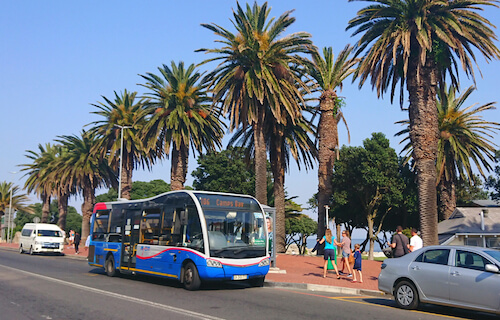 MyCiti feeder bus in Camps Bay
MyCiti feeder bus in Camps BayCape Town Transport | Getting around by Bus
The MyCiti bus rapid transport network is expanding rapidly. Many suburbs and the main tourist attractions such as the V&A Waterfront, Table Mountain and Sea Point are well-linked to the main feeder service. The main routes run between Table View and the Civic Centre main station and the airport and city centre. Further services extend out as far as Atlantis and Khayelitsha. Various routes connecting further outlying suburbs or nearby towns to the growing network are currently under construction. Have a look at the route map here and the activity map for suggestions on sightseeing in the city here.
Simply buy a MyCiti card to pay for your trips and start exploring. There are different peak/off-peak tariffs, more info here.
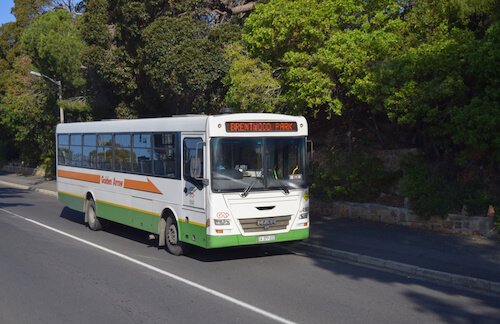 Golden Arrow bus in Fishhoek
Golden Arrow bus in FishhoekMyCiti runs also feeder buses to the main bus stations and these smaller buses are very convenient and safe as well. Outside the MyCiti network, not all commuter buses are new but the older Golden Arrow buses that run throughout the city, connect many suburbs or outlying areas with the city center. Find more info on the Golden Arrow busses here.
Cape Town Transport | Getting around by taxi cab
Travelling in a limousine cab or metered taxi is definitely the easiest and most convenient way of getting around town, but also more on the pricey side. It is definitely worth to pay a few bucks more for a trip during the evening hours or at night when you want to get home from an evening. Taxi cabs in Cape Town charge around R10-15 per km depending on the area and further additional charges - such as for extra luggage and number of passengers or extra stops.
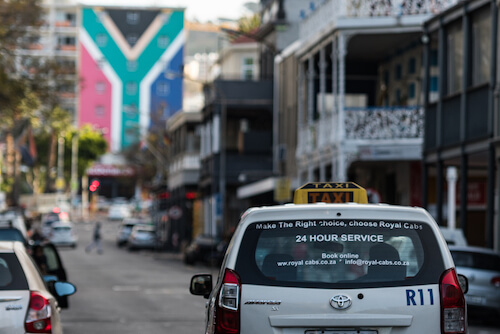 Taxis in Cape Town
Taxis in Cape TownThere are only a few taxi ranks around the city center in Cape Town. These are located mainly at the major tourist sights. Usually, you will not be able to hail a taxi cab from the street and it is advisable that you pre-book any taxi trip. Taxis can be ordered from restaurants, hotels and shopping centers. Various local taxi companies such as Rikkis, Intercab or Excite can be contacted and restaurants usually have a list of reliable drivers too. Please check the meter or arrange a rate beforehand not to be unpleasantly surprised.
Uber has reached Cape Town too and already has a large fleet of driver in the categories X and XL, as well as a more limited number of private taxis of the 'Black' premium category. Their drivers are monitored and registered and considered commonly as reliable and safe. Get more info about UBER here.
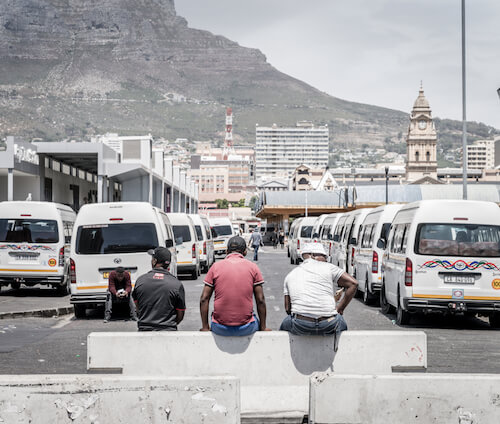 Cape Town station deck's taxi rank
Cape Town station deck's taxi rankCape Town Transport | Getting around by minibus taxi
It is strongly recommended to only use minibus taxis when travelling with a local who is experienced in travelling by minibus taxis. Minibus taxis operate mainly on routes from/to townships. The minibus taxis can be hailed on the street and are paid cash per trip. These taxis often only depart when a taxi is full. However, if you are in Cape Town as a tourist and are not clued up about the South African way to get around in minibus taxis, do not simply get into one and try your luck. You should have a local introducing you to the system and know the ins and outs about minibus travel first. Although the minibus taxi rides are more cost effective, travelling by minibus taxi is usually not considered as safe and many drivers are reckless drivers.
Cape Town Transport | Getting around by motorbike
Motorbike or scooter rental is possible in Cape Town as well. It is best to get in contact with a rental company such as Cape Bike Rentals to enquire about your best options. If you always wanted to ride a Harley Davidson, find out about your options here.
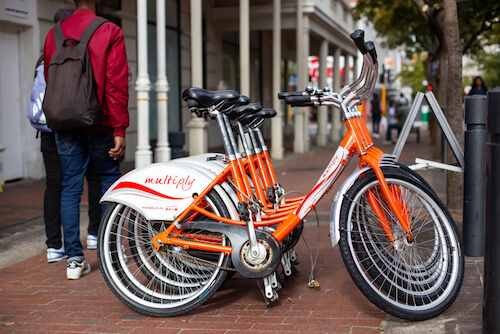 Bicycle Rentals in Cape Town
Bicycle Rentals in Cape TownCape Town Transport | Getting around by bicycle
The network of cycle lanes is improving in the city, but there are rarely dedicated cycle lanes within the CBD. There are wonderful and long cycle paths from the city center through Green Point and Sea Point as well as from the city center up the West Coast to Melkbosstrand. Be cautious, however, as sometimes the track can be obstructed by sand, glass or debris and therefore it is recommended to take a puncture kit along. It is also always best to cycle only in groups especially when out of town or travelling along remote roads and cycle paths.
Bicycles can be rented from various outlets, such as Up Cycles at the Waterfront or Bicycle Hire in Blaauwberg. And if you bring your own bike along and need a service, check out Neil Buckland's NBCycles in Pinelands. Some rental companies also rent out e-bikes, especially in the city center and along the Sea Point promenade.
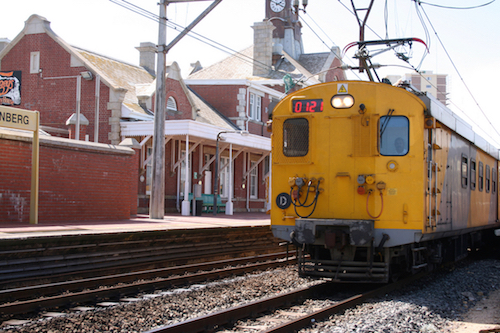 Metrorail Train in Muizenberg
Metrorail Train in MuizenbergCape Town Transport | Getting around by train
Some of the Eastern Suburbs, such as Bellville and Montevista, and the Southern suburbs, such as Rondebosch or Wynberg, as well as towns such as Muizenberg, Simonstown are serviced by the Metrorail system which is based in the newly refurbished Cape Town station. You can access the Cape Town trains website here. Be aware though about petty crime around the train stations - and make sure to stick to the usual safety rules. See our safety tips for Cape Town here.
Train travel is usually safe during the day, but avoid taking the train after dark. Always make sure to avoid empty compartments and best travel in groups you know - especially if travelling as a woman. During rush hours, the trains are often overloaded and it might prove difficult to get in or off the train. The trip along the False Bay coast is a very scenic ride which can be enjoyed outside rush hours. Check the schedule with the Metrorail app here.
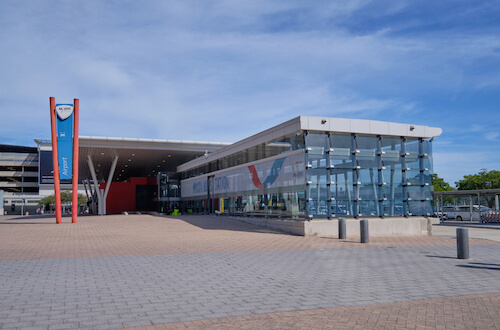 Cape Town Airport MyCiti Bus Station
Cape Town Airport MyCiti Bus StationCape Town Transport | Airport shuttle bus
The MyCiti airport shuttle runs from Cape Town International Airport to Civic Centre in the CBD every twenty minutes. The trip to the city centre takes about half an hour depending on traffic and costs around R80 (depending on fare and discount options). The City of Cape Town's public Myciti Rapid Transport Shuttle is reliable and safe.
For private airport transfer book with any airport shuttle companies that operate from their desks in the Central Hall at Cape Town International Airport. Or book a reputable shuttle company beforehand, check the price and check if you will be driven directly to your destination or the driver plans to wait for somebody else to join you for the trip. More info and reliable airport shuttle operator's contact numbers here.
Cape Town Transport | Getting around by Car
 Scenic drive around Chapman's Peak
Scenic drive around Chapman's PeakUntil the main bus routes are serviced in an interlinked network throughout the city, most of you will still need to rely on a car for more convenient personal transport. If you plan to live in Cape Town, you surely will consider buying at least one car for your family. When we moved to Cape Town we rented a car for the first two weeks and in this time we were very actively were looking for a suitable family car.
Buying a car is surely the most popular option when considering your Cape Town transport and also cheaper than renting a car for a longer time. If you buy your first car here from a car dealer, they will usually arrange registration and licensing for you. Where and how to register your car and which documents you need, if you buy a car from a private person, read on here.
Renting a car is also an option when looking for transport for a short amount of time. If you are looking for cheap car rental in Cape Town or want some advice on renting a car in Cape Town please read our tips here.

Travel Tips | Driving Tips | Driving in Cape Town
Driving your own car in Cape Town is not different from driving in any other cosmopolitan city around the world. Like in Britain or any former British colony you will be driving on the left side of the road. Some important things to know are:
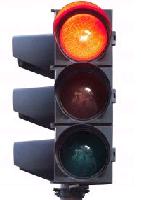 A traffic light is called 'robot' in South Africa
A traffic light is called 'robot' in South Africa- You will need a valid driver’s license in English here, so if yours is not in English, then you will have to get an International Drivers license from your country or you can try to get a translation and validification of your foreign license from your consulate. Your drivers licence in any case must include a photo.
- Road signage is generally very good and usually given both in English and in Afrikaans. Take care when looking for a street name in the CBD of Cape Town as names are given sometimes in Afrikaans only, although your map or street directory will list the name only in English or vice versa, such as Wale vs. Waal Street. During the last couple of years, a number of roads and highways have been renamed also. Read about Cape Town's renamed roads here.
- The destination signs give the distance in kilometers.
- Speed limits are set on all the roads. There are quite a lot of speed traps or cameras on various roads and traffic lights all over Cape Town. Tickets for speeding will be sent to the address where the car is registered. You can pay fines online. More info here.
- The official speed limits are between 60kmh (35mph) and 80kmh (45mph) in the city and 120kmh (75mph) on all open roads and the motorways.
- Parking can be found easily in the city center in parking arcades or in marked street parking zones. When parking on the side of a street never park on yellow lines as you car most likely will be clamped or towed away. Official park attendants usually show you to an open parking spot and then will register your car on their hand-held computer system. Usually you pay upfront the standard amount of R10-15 per hour.
- Petrol is cheaper n South Africa than in many places around the world. Petrol attendants will fill your tank, wash your windows or check your car's oil and water levels. Pay cash or get a garage card from your bank to pay for petrol and garage services. Credit cards are usually accepted as method of payment at the filling stations nowadays too. Allow gratuity R5-10 for good service.
- Road-closures do happen due to construction work and other circumstances. Make sure to bookmark this page on road-closures.
For some important Cape Town transport information on what to do and what to take special care of when driving in the Mother City please refer to our Top 10 tips about driving in South Africa, a page about the basics on driving your own car in Cape Town and special traffic rules you should know when driving here.
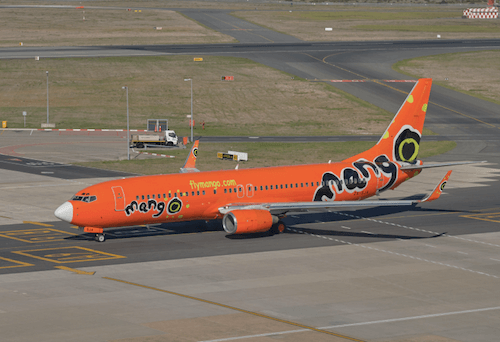 Mango - low budget airline of SAA
Mango - low budget airline of SAACape Town Transport | Travelling around South Africa
Air transport is the most convenient and time-effective way to travel if you want to venture further away from the Mother City and want to get around South Africa quickly and easily. Air transport is not cheap in South Africa, but low-cost airlines, such as Mango or Kulula or Safari operate as well and often offer special rates. Read more about airlines operating flights to Cape Town and in between South African cities here.
Train travel with the famous Blue Train for Cape Town to Pretoria or the Shosholoza Meyl are comfortable and exciting trips if you travel between Cape Town and Johannesburg or Cape Town to East London.
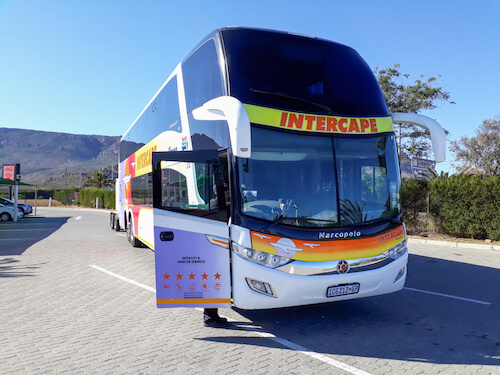 Intercape bus travel
Intercape bus travelInter-city Bus Services like Intercape and Greyhound service not only the Wider Cape Town area but also cities and towns in the Western Cape and link the Mother City to many cities across South Africa. The air-conditioned 'luxury' buses operate routes to all major South African cities. The Baz Bus, a backpacker bus service, is a popular alternative used by many young travellers and includes many stops along scenic routes.
References for Cape Town Transport
- "Cape Town Traffic Live". TomTom. Accessed 20 November 2019. https://www.tomtom.com/en_gb/traffic-index/cape-town-traffic
- "The Trains for Future of South African Cities." Future Cape Town. 8 June 2015. Last Accessed 20 November 2019. http://futurecapetown.com/2015/06/future-cape-town-the-trains-for-future-of-south-africas-cities/
- "Private Transport" City of Cape Town Transport. Accessed 20 November 2019. https://www.tct.gov.za/en/transport/getting-around/private-transport/
- "Transport Development Index" City of Cape Town. Accessed 20 November 2019. https://www.tct.gov.za/en/resources/indices/indices/
- "These are the Worst Times to Drive in Joburg, Cape Town and Durban." BusinessTech. 4 June 2019. Accessed 20 November 2019. https://businesstech.co.za/news/motoring/321263/these-are-the-worst-times-to-drive-in-joburg-cape-town-and-durban/
- "The cities with the worst traffic in South Africa" Business Tech. 14 February 2019. Accessed 20 November 2019. https://businesstech.co.za/news/motoring/299448/the-cities-with-the-worst-traffic-in-south-africa-and-how-load-shedding-has-made-it-so-much-worse/
Related Pages
Image Credits on the Cape Town Transport page: All by Shutterstock.com except Cape Town Traffic Jam by BusinessTech, editorial credits go to: Peter Tittmuss (MyCitiBus Waterfront); A. Mertens (MyCiti bus Camps Bay); Authentic Travel (Golden Arrow bus); gabrielaraujo1510 (Cape Town taxi); Alexey Stiop (minibus taxi rank); RichT Photo (cycles); Jean Francois Me (airport bus station); Jean Francois Me (Mango airplane - edited); Authentic Travel (Intercape bus)
